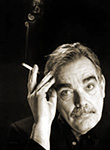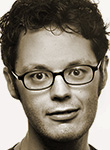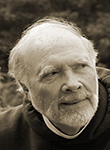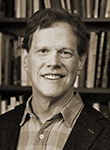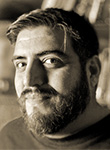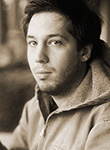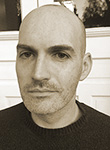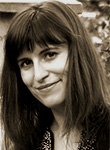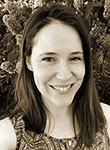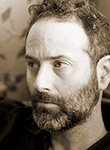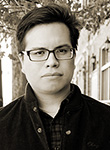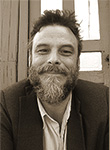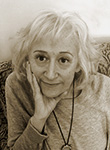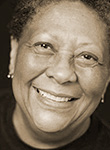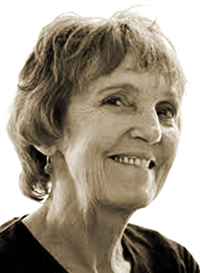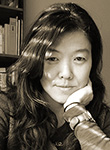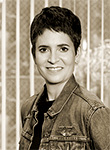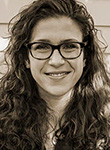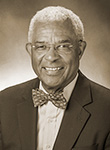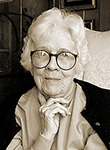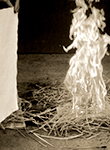Welcome to Blackbird’s second issue of the Covid-19 year—created with care through Zoom meetings, emails, and phone calls. While the majority of the content was accepted before the March lockdowns, we have begun to see work that specifically addresses the challenges of the end of this second decade of the 21st Century. And we are paying even closer attention to the pervasive infection of isolation, debility, and anxiety that has come to dominate much work that has come our way since 2016.
This fall marks Blackbird’s nineteenth Levis Remembered, which calls attention to the work of Larry Levis and recognizes Ilya Kaminsky, winner of the twenty-third annual Levis Reading Prize.
Levis appears here in the poem “Winter Stars,” an elegy for the poet's father that finds a route toward love and reconciliation through a shared night sky, while still recognizing that “it's empty out there, & cold.” Manuscript variations of the poem as well as a prose treatment of the poem’s opening action are also published here.
Kaminsky’s prize-winning book, Deaf Republic, opens in the occupied town of Vasenka with the shooting of a young boy by a soldier. The gunshot renders the whole town deaf. This silence drains out from the poems, while “in the empty streets of our district, a bit of wind / called for life.”
Kaminsky is represented by four poems from his winning collection, by a video capture of his reading and the accompanying question and answer session about his work, and by a review of the book by Colin Bailes.
Two essays written in response to the pandemic particularly underline our self-consciousness at being somewhat trapped in a moment of unpredictable tension.
Jesse Lee Kercheval’s “The Long Way Home” puts language to the experience of being stranded in Uruguay during the initial Covid-19 travel ban. While she recalls memories of home and of the past, she notes that this detainment yields surprising results: “The dream was one of exaltation. I was on a plane! . . . But it was not a dream about finally returning home . . . I was perfectly, totally relaxed, a sensation I had almost forgotten.”
Hal Crowther’s “Godforsaken: Of Death and Daffodils” is also situated against the backdrop of a Covid-19 lockdown and takes a more philosophical bent to explore a struggle with the concept of finding solace in religion in the face of tragedy. He writes, “But if this god is omnipotent, fully capable of answering desperate prayers and deflecting catastrophes like this pandemic, then is he not, in any human terms, unjust and morally compromised?”
In Poetry, Bruce Bond navigates a landscape that showcases the beauty of pain. His poems echo with despair, while aiming toward the perfect balance of grieving—the process of letting go. He strings his words with a sharp needle, and finds ways to anchor the poems with the art of brokenness. “[I]t could be worse,” he notes in “Scar 26,” “You could go numb with shock and say, it could be worse.”
David Campos highlights issues of identity connected to race and nationality. “The Singularity Keeps to Himself” particularly captures emotional moments (“when the rust of your love reaches your throat”) with conscious observation.
Patricia Clark’s poems take on rituals of remembrance that range from the wistful nostalgia of “Count the good times on one hand. / And finger the memories like rosary beads,” to introspective moments of discovery: “If I wanted to kneel at the pond, it was to know / how like my mother I’ve become.”
J.P. Grasser deploys his poems to excavate the everyday lives of their speakers, in the process exposing mundane rituals and the socio-economic factors at play within them. Employing elements of nature and the culture of “cowboy-folk,” Grasser’s work wrestles with the familiar ghosts of heartache, isolation, loneliness, and labor.
Twisting language to the point of absurdity, Daniel Groves’s fast-paced, sonically captivating poems unfold with controlled satirical tones, pointing out the irony and strangeness of being Dick and Jane and Evel Knievel in our pop culture moment.
In “A Dream Dependent,” Cate Lycurgus negotiates between dream and reality, utilizing the golden shovel form to illustrate the fragile mystery of a lawn of mushrooms that appeared overnight. But implicit to this creation is the threat of destruction, both of delicate mushrooms and of the world overall, as there are “many ways a body can be undone.”
Oksana Maksymchuk explores the convolutions of isolation and observation at work in relationships. The speaker in “Alla Through the Looking Glass” notes “the resilience of genes / the disquieting miracle of survival” in what her grandmother has passed on to her.
Tyler Mills weaves images of nature through precise lines to examine the subject of motherhood in relationship to the body. “Big Heart, Little Heart” provides a dreamscape where she asks, “What did she know / about how I hid you, / as you strummed / the veins and foam / tidal in my belly / and fluttered like a silver fish?”
Dan O’Brien’s prose poems array unexpected images to explore his family’s experience with cancer. In “A Nurse’s Tattoo” he writes, “The butterfly’s wings are lungs. The chemo chair’s the chair. The needle / slides into my vein, I slide segmented into the whirling orifice, holding / my breath.”
Personal and prosaic in equal measures, Sebastián Hasani Páramo seamlessly unites word and form to call forth imagery that is as grounded in reality as it is steeped in fantasy. Addressing his reader, he limns his own practice of writing with the question: “Why not root here, let my arms / branch & reach for a language / fit for yearning.”
Steve Scafidi’s “The Bull Leaper’s Birthday” considers the passing of time by pitting his eighty year old father, who “lies on the sofa and rests” against the metaphor of bull leaping, a practice dating back 4000 years. Scafidi does not question “the scars,” real or imagined; he watches, with his family, over his father, noting, like the bull leaper, “when you are in luck / . . . you flick / your life through the air like a bird.” A reading by Scafidi also appears in Features.
G.C. Waldrep blends historical fact and theological pondering in elegies for Simone Weil and reflections on the heritage of place and family. As the speaker in “(Renault / Paris / 1935)” inquires “how many monuments / must I suckle, Father—” the speaker in “Merleau-Ponty” contemplates “acts of description / inspiral,” that keep a place alive in faith and memory.
In Fiction, Rachel Hall chronicles the attempts of a school community to reconcile the events and aftermath of a shooting in her story “After.” In reverse chronological order, the community works around the “incident,” particularly the parents who “watch their children sleep, . . . their chests rising and falling, the delicate knit of rib beneath the skin. Such beauty. It could break your heart.”
Pingmei Lan’s story sets a traditional coming-of-age narrative within the complicated context of China’s political environment. “I would soon move to America and see things differently.” The story begins, “But in 1988, I was a model student at Beijing University (BU) High. A member of the Communist Youth League. A librarian’s daughter. A good girl.”
Marilyn Nelson continues her translation from the Danish of the late Inge Pedersen’s fiction with “Mail,” the fourth installment of a previously untranslated novel. Here, the narrator writes a letter to her boyfriend in another city and voices her impatience to be reunited: “as I think about how much I love you, I’ll start to feel afraid of losing you. Afraid of death. But when I look into your eyes I can’t imagine that either of us will ever die . . . ”
Erica Wagner’s “Delaware & Raritan. 1850” creates a moment from the childhood of Washington A. Roebling, the builder of the Brooklyn Bridge. She presents an incident in which a smaller boy in Roebling’s charge drowns. Wagner recounts the events with a precision of detail that breathes emotional life into historical fact.
In Nonfiction, the fifth installment of Wesley Gibson’s memoir You Are Here continues the story of his relationship with New York City as a young gay man from Virginia at a time when the city was ravaged by the AIDS epidemic. This excerpt particularly recounts his distanced interactions with his two roommates as he forms a connection with them only out of necessity as one man’s health visibly deteriorates.
In Gallery, the Mountain Lake Triptych pays homage to The Mountain Lake Symposium and Workshop: Art in Locale, a volume that documents two decades of collaboration by prominent artists who gathered in Virginia’s Blue Ridge Mountains to make and talk about art. Presented here are an excerpted essay by Howard Rissati exploring the collaborative spirit of the workshops, a walk-through of experimental art-making processes originated and practiced in the workshops by Ray Kass, and a retrospective look at the workshops by Susan Glasser, who assesses “if the project resonates in 2020, a decade after the last programs concluded.
George Ferrandi also gives us a brief look at her progress on (and inspiration for) a twelve edition print, The Wilds.
In Features we remember the late poet Eleanor Ross Taylor in her one hundredth year by revisiting her publications in previous issues of Blackbird. Hailed as a poet of genius by Jean Valentine, Taylor practiced poetry with an economy and subtlety of language and emotion that place her squarely as a compatriot of Emily Dickinson in the American canon. We were honored to publish her.
In February of 2020, Emily Nemens visited Richmond to receive the Rebecca Mitchell Tarumoto Prize at a reading honoring her winning story “After Incus”(Blackbird v17n1). Appearing with Nemens was Christine Schutt who read from her collection of stories Pure Hollywood. A video of the reading as well as a transcript of a question and answer session appear here.
Rounding out the issue is a video capture of a conversation between Larry Palmer and Jeffrey Blount covering Palmer’s memoir Scholarship Boy: Meditations on Family and Race and presented at VCU’s James Branch Cabell Library. Also appearing is a video of a short reading from the book by Palmer. ![]()
Return to top menus | Browse issue
